Certain essential oils have been investigated for their potential repellent properties in the prevention of head lice infestations. This blog discusses ten essential oils that may help with head lice prevention.
Harnessing the Power of Nature: The Best Essential Oils for Lice Defense
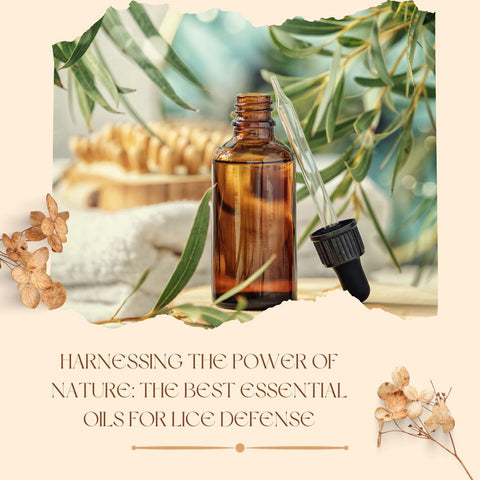
Harnessing the power of nature can be an effective approach to lice defence, and essential oils are known to have repellent properties. Some of the best essential oils for lice defence include tea tree oil, lavender oil, peppermint oil, eucalyptus oil, rosemary oil, neem oil, clove oil, thyme oil, geranium oil, and cinnamon leaf oil. To avoid skin irritation, essential oils used for lice defence must be properly diluted in a carrier oil, such as coconut oil or olive oil. Additionally, perform a patch test before using any essential oil to ensure that you do not have an allergic reaction. While essential oils can be an effective tool in lice prevention, they should be used in conjunction with a comprehensive approach that includes regular hair washing, combing with a fine-toothed comb, and avoiding direct contact with lice-infested individuals.
Tea Tree Oil: Nature's Potent Lice Repellent
Tea tree oil, derived from the leaves of the Melaleuca alternifolia tree native to Australia, is well-known for its powerful antimicrobial properties and is regarded as nature's most effective lice repellent. Here's why tea tree oil is so effective against lice:
-
Tea tree oil contains insecticidal compounds, including terpinen-4-ol and cineole. These compounds interfere with lice's nervous system, causing paralysis and death.
-
The strong scent of tea tree oil repels lice, preventing them from infesting the scalp. When applied to the hair and scalp, tea tree oil forms a barrier that makes it difficult for lice to attach to the hair shafts.
-
Tea tree oil has broad-spectrum antimicrobial properties, making it effective against bacteria, fungi, and parasites such as lice. By inhibiting the growth of microorganisms, tea tree oil helps prevent lice infestations.
-
Tea tree oil, unlike chemical-based lice treatments, is a natural and safe alternative. It contains no harmful pesticides or synthetic chemicals, making it suitable for use on both children and adults.
-
Tea tree oil can be easily incorporated into lice prevention routines. It can be applied directly to the scalp and hair after dilution with a carrier oil, such as coconut oil or olive oil, or mixed with shampoo or conditioner for regular use.
-
In addition to repelling lice, tea tree oil promotes scalp health. It helps soothe itching and irritation caused by lice bites and has a refreshing, cooling effect on the scalp.
-
Tea tree oil is derived from a renewable natural source and is biodegradable, making it an environmentally friendly option for lice prevention.
Lavender and Eucalyptus: Soothing Scents that Ward Off Lice
Lavender and eucalyptus are two essential oils known for their soothing scents and ability to repel lice. Here is how these oils can help with lice prevention:
Lavender Oil:
-
While not as effective as tea tree oil, lavender oil has been studied for its insect repellent properties. Its fragrance is thought to prevent lice and other insects from infesting the scalp.
-
Lavender oil has a calming and soothing aroma that can help relieve stress and anxiety caused by lice infestations. It promotes relaxation and may help with sleep quality.
-
Lavender oil contains antimicrobial properties that can help keep the scalp healthy. It may help to relieve itching and irritation caused by lice bites while also promoting scalp healing.
-
Lavender oil is gentle and well-tolerated by most people, making it appropriate for use on both children and adults. It can be mixed into shampoos, conditioners, or homemade lice repellent sprays.
Eucalyptus Oil:
-
Eucalyptus oil has a strong, refreshing scent that lice dislike. Its strong odour serves as a natural deterrent, making it difficult for lice to infest the scalp.
-
Eucalyptus oil contains compounds like eucalyptol, which have antimicrobial properties. It can help keep the scalp clean and free of bacteria and fungi, which lowers the risk of secondary infections.
-
When applied to the scalp, eucalyptus oil provides a cooling sensation that can help relieve the itching and discomfort caused by lice infestations.
-
In addition to its lice-repelling properties, eucalyptus oil has respiratory benefits. Its invigorating aroma can help clear the airways and make breathing easier.
Peppermint and Rosemary: Refreshing and Effective Lice Prevention
Peppermint and rosemary essential oils are not only refreshing, but they also help prevent lice. Here's how these oils can help keep lice at bay.
Peppermint Oil:
-
Peppermint oil has a strong minty aroma that lice dislike. Its strong fragrance serves as a natural deterrent, making it difficult for lice to infest the scalp.
-
When applied to the scalp, peppermint oil has a cooling effect that can help relieve itching and discomfort caused by lice bites. It also makes a hostile environment for lice.
-
Peppermint oil contains menthol, which has antimicrobial properties. It can help keep the scalp clean and free of bacteria and fungi, which lowers the risk of secondary infections.
-
Peppermint oil stimulates the senses and can help you feel more energetic. Its refreshing aroma can help to improve mood and promote a sense of well-being.
Rosemary Oil:
-
Rosemary oil has been studied for its insect repellent properties, including its ability to deter lice. Its fragrance is thought to prevent lice from infesting the scalp.
-
Rosemary oil contains antioxidants, which help protect the scalp and hair follicles from free radicals. It improves scalp health and may stimulate hair growth.
-
Rosemary oil has a pleasant, herbaceous aroma that can help mask the odour of the scalp, making it less appealing to lice. Its refreshing scent can also aid in relaxation and mental clarity.
-
When applied to the scalp, rosemary oil can help improve circulation and stimulate hair follicles. It promotes healthy hair growth and may help prevent hair loss and hair thinning.
Creating Your Lice Prevention Toolkit: Essential Oil Recipes and Tips
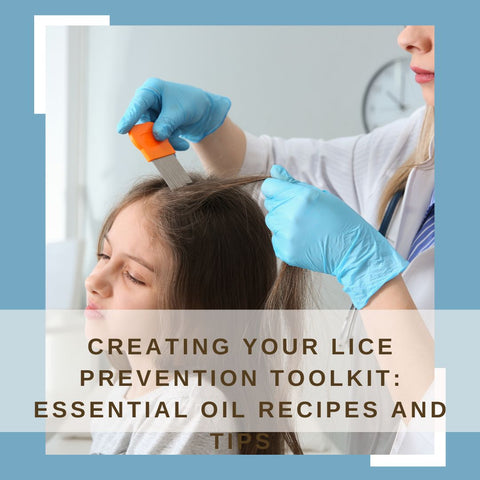
Creating a lice prevention toolkit with essential oil recipes and tips can help keep lice at bay. Here's how to put together your toolkit:
-
Essential Oil Repellent Spray: In a spray bottle, combine 10-15 drops of tea tree, lavender, peppermint, and rosemary oils with water. Shake thoroughly before each use, and apply to hair and scalp daily, especially before school or other lice-prone environments.
-
Lice Prevention Shampoo: Pour 10 drops of tea tree oil, lavender oil, and eucalyptus oil into your regular shampoo bottle. Use this shampoo regularly to keep your scalp clean and lice-free.
-
Detangling Spray: In a spray bottle, combine 5-7 drops lavender oil and 5-7 drops rosemary oil with water. Use this spray to detangle hair and make combing easier while lowering the risk of lice transmission.
-
Scalp Treatment Oil: Combine 2-3 drops of tea tree oil, peppermint oil, and eucalyptus oil with 1 tablespoon of carrier oil (such as coconut oil or olive oil). Apply this mixture to your scalp and massage gently to promote scalp health and lice prevention.
-
Lice Prevention Comb: Use a fine-toothed comb designed specifically for lice prevention to comb through your hair regularly. Apply a few drops of tea tree or peppermint oil to the comb before each use to increase the repellent effect.
-
Avoid Sharing Personal Items: Educate family members, particularly children, on the importance of not sharing personal items such as combs, hairbrushes, hats, scarves and helmets to reduce lice transmission risk.
-
Regular Hair Checks: Check your family members' hair regularly for lice or nits. Look for small, oval-shaped insects crawling on the scalp and tiny white or brown dots attached to the hair shafts.
-
Launder Bedding and Clothing: To kill lice or nits, wash bedding, clothing, hats, and other items that come into contact with the head regularly in hot water and dry them on high heat.
-
Educate Others: Provide information about lice prevention and the use of essential oils with friends, family, and the school community. Encourage others to incorporate these natural remedies into their lice-prevention regimens.
-
Professional Consultation: If the lice infestation persists despite preventive measures, seek advice and treatment from a healthcare professional or lice removal specialist.
By creating a lice prevention toolkit with essential oil recipes and tips, you can take proactive steps to naturally and effectively protect yourself and your family against lice infestations.
DIY Essential Oil Lice Prevention Sprays and Shampoos
Making DIY essential oil lice prevention sprays and shampoos is a natural and effective way to deter lice while also maintaining scalp hygiene. Here are some simple recipes for both.
-
Essential Oil Lice Prevention Spray: Ingredients are 2 ounces of distilled water, 1 teaspoon of witch hazel or vodka (optional, for preservation), 10 drops of tea tree oil,10 drops of lavender oil, 5 drops of peppermint oil, 5 drops of eucalyptus oil and 5 drops of rosemary oil. In a small spray bottle, combine the distilled water and witch hazel or vodka (if using). Add the tea tree oil, lavender oil, peppermint oil, eucalyptus oil, and rosemary oil to the bottle. Secure the cap and shake well to mix the ingredients thoroughly. Spray onto hair and scalp before school, daycare, or any other lice-prone environment. Focus on the scalp, hairline, and behind the ears. Shake well before each use, and store the spray in a cool, dark place between uses.
-
Essential Oil Lice Prevention Shampoo: Ingredients are 8 ounces of unscented shampoo or baby shampoo, 20 drops of tea tree oil, 15 drops of lavender oil, 10 drops of eucalyptus oil and 10 drops of rosemary oil. Pour the unscented shampoo into a clean, empty bottle with a secure cap. Add the tea tree oil, lavender oil, eucalyptus oil, and rosemary oil to the bottle. Secure the cap and shake well to thoroughly mix the ingredients. Use the shampoo as you would normally, lathering it into wet hair and massaging it into the scalp. Leave the shampoo on for a few minutes before rinsing thoroughly with warm water. Repeat as needed, especially before potential lice exposure or during outbreaks.
Optimal Application Techniques for Maximum Protection
When using essential oil-based lice prevention products, it is critical to use proper application techniques for the best results. To ensure maximum protection, apply directly to the scalp, divide hair into sections, massage into the scalp, pay attention to hotspots, use a fine-toothed comb, reapply as needed, be consistent, and monitor for signs of infestation. By using these best application techniques, you can increase the effectiveness of essential oil-based lice prevention products and protect yourself and your family from infestations. Always use essential oils safely and perform a patch test before applying them to your skin or scalp.
Safe Use of Essential Oils for Children and Sensitive Scalps
When using essential oils for lice prevention, it is critical to ensure their safety, particularly for children and those with sensitive scalps. Here are a few guidelines to follow:
-
Always dilute essential oils before applying them to the scalp or skin, especially on children. To dilute the essential oils, add a carrier oil such as coconut oil, olive oil, or almond oil. For children and people with sensitive skin, the typical dilution ratio is 1-2% essential oil to carrier oil.
-
Before using any essential oil on your scalp or skin, conduct a patch test, especially if you or your child has sensitive skin or a history of allergies. Apply a small amount of diluted essential oil to a small area of skin and wait 24 hours to see if any adverse reactions occur, such as redness, itching, or irritation.
-
Keep essential oils away from your eyes and mucous membranes, as they can irritate and cause discomfort. If accidental contact occurs, flush the area with water right away.
-
When using essential oils for children, choose safe oils like lavender, tea tree, and chamomile. Avoid using oils that are too strong or irritating to children, such as peppermint or eucalyptus.
-
When applying essential oils to the scalp, be gentle to avoid irritation or discomfort. Use gentle massage motions with your fingertips to evenly distribute the oil.
-
After using essential oils, check the scalp and skin for signs of irritation or allergic reactions. If you experience any redness, itching, or discomfort, stop using the product right away and rinse the area thoroughly.
-
If you have any concerns about using essential oils for lice prevention, particularly for children or people with sensitive scalps, seek advice from a healthcare professional or aromatherapist.
-
If you or your child are sensitive to essential oils, consider using natural lice repellent sprays or non-chemical lice treatments.
Beyond Prevention: Essential Oils for Head Lice Treatment and Care
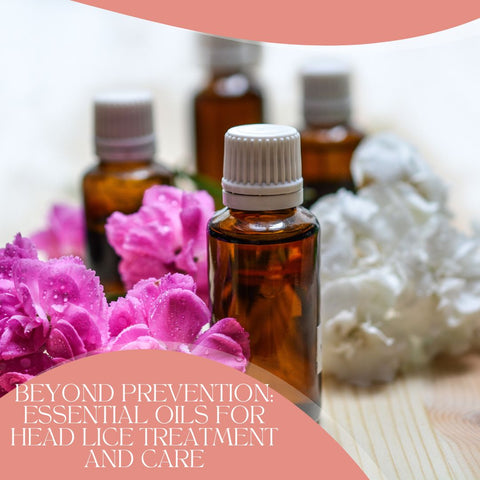
Essential oils can be used to treat and care for head lice in addition to preventing them. While they may not be effective in eliminating lice infestations on their own, they can supplement other treatment methods and provide relief from symptoms. Here are a few essential oils that may help with head lice treatment and care:
-
Tea tree oil is a highly effective essential oil for head lice treatment. It contains insecticidal terpenes, which can help kill lice and their eggs. Combine tea tree oil and a carrier oil and apply to the scalp and hair, leaving it on for several hours or overnight before washing it off. For best results, repeat this process several times over one week.
-
Lavender oil has soothing properties that can help relieve the itching and irritation caused by head lice infestations. It also has antimicrobial properties, which may help to prevent secondary infections. To relieve discomfort, mix lavender oil with a carrier oil and apply to the scalp and hair.
-
Eucalyptus oil contains insecticidal properties that can help kill lice and their eggs. It also has a refreshing scent that can help mask the odour caused by head lice infestations. Apply eucalyptus oil and a carrier oil to the scalp and hair, leaving it on for several hours before washing.
-
Peppermint oil has a cooling effect that can help relieve the itching and discomfort associated with head lice infestations. It also has antimicrobial properties, which may help to prevent secondary infections. To relieve symptoms, mix peppermint oil with a carrier oil and apply to the scalp and hair.
-
Neem oil, derived from the neem tree, contains insecticidal properties that can help kill lice and their eggs. It also has antibacterial and antifungal properties, which may aid in preventing secondary infections. Combine neem oil and a carrier oil and apply to the scalp and hair, leaving it on for several hours before washing it off.
Combining Essential Oils for Enhanced Lice Treatment Efficacy
Combining essential oils can improve the efficacy of lice treatment by taking advantage of the synergistic effects of various oils. The following are some effective combinations for lice treatment:
-
Tea Tree and Lavender Oil Blend: Tea tree oil is extremely effective at killing lice and their eggs, whereas lavender oil calms the scalp and relieves irritation. Apply tea tree and lavender oil in equal parts to the scalp and hair, along with a carrier oil like coconut or olive oil. Leave it on for a few hours or overnight before washing it away.
-
Tea Tree and Eucalyptus Oil Blend: Tea tree and eucalyptus oils are both insecticidal, meaning they can kill lice and eggs. Mix equal parts tea tree oil and eucalyptus oil with a carrier oil and apply to the scalp and hair. Leave it on for a few hours before washing it away.
-
Tea Tree, Lavender, and Peppermint Oil Blend: This combination offers an effective treatment for lice infestations. Tea tree oil kills lice and their eggs, lavender oil calms the scalp, and peppermint oil relieves itching. Apply a mixture of tea tree oil, lavender oil, and peppermint oil to the scalp and hair. Leave it on for several hours before washing it off.
-
Tea Tree and Neem Oil Blend: Neem oil has insecticidal properties and can be used to kill lice and eggs. When combined with tea tree oil, it forms an effective treatment for lice infestations. Apply a carrier oil containing equal parts tea tree oil and neem oil to the scalp and hair. Leave it on for several hours before washing it off.
-
Lavender and Rosemary Oil Blend: Lavender oil calms the scalp and relieves irritation, whereas rosemary oil has antimicrobial properties that may help prevent secondary infection. Apply a carrier oil containing equal parts lavender and rosemary oil to the scalp and hair. Leave it on for several hours before washing it off.
To avoid skin irritation, dilute essential oils for lice treatment properly with a carrier oil. Before using any essential oil, perform a patch test to ensure there is no allergic reaction. Essential oil blends should also be used as part of a comprehensive lice treatment plan, which includes combing, washing bedding and clothing, and vacuuming to remove lice and their eggs from the environment.
The Role of Carrier Oils in Treating Head Lice with Essential Oils
Carrier oils are important in treating head lice with essential oils because they dilute their potency and help to distribute them evenly on the scalp and hair. Carrier oils improve lice treatment effectiveness through dilution, skin protection, even distribution, moisturization, enhanced absorption, longer lasting effect, and compatibility. Carrier oils commonly used in lice treatment formulations include coconut oil, olive oil, almond oil, jojoba oil, and grapeseed oil. When using carrier oils for lice treatment, it is critical to use high-quality, cold-pressed oils and conduct a patch test before applying them to the skin or scalp to ensure compatibility and reduce the risk of adverse reactions.
Maintaining a Lice-Free Scalp: Routine Care with Essential Oils
Maintaining a lice-free scalp entails incorporating routine care with essential oils to help prevent re-infestation and promote scalp health. Here's how you can use essential oils in your maintenance routine:
-
Regular Scalp Massage: Add a few drops of tea tree oil, lavender oil, or eucalyptus oil to a carrier oil such as coconut oil or olive oil. This blend should be massaged into the scalp regularly to help deter lice and nourish it.
-
Daily Use of Lice Prevention Products: Use lice prevention products like sprays or shampoos infused with essential oils daily, especially during peak lice seasons or when there is a known lice outbreak in your area.
-
Hair Care Products: Look for products that contain essential oils that are known to repel lice, such as tea tree oil or lavender oil. These products can help you maintain a lice-free scalp while also keeping your hair healthy.
-
Combing with Essential Oils: Using a fine-toothed comb, add a few drops of tea tree or lavender oil and comb through your hair regularly. This can help remove any lice or nits that may be present and prevent future infestations.
-
Bedding and Clothing: To kill any lice or nits, regularly wash bedding, clothing, hats, and other items that come into contact with the head in hot water and dry them on high heat.
-
Avoid Sharing Personal Items: To reduce the risk of lice transmission, teach family members, particularly children, not to share personal items such as combs, hairbrushes, hats, scarves or helmets.
-
Regular Head Checks: Conduct regular head checks on yourself and your family members to look for signs of lice infestation. Look for small, oval-shaped insects crawling on the scalp and tiny white or brown dots attached to the hair shafts.
-
Environmental Maintenance: Vacuum carpets, upholstery and car seats regularly to remove any lice or nits that have fallen from the head. Consider using essential oil-based sprays to freshen up these areas while also repelling lice.
Navigating Challenges: Considerations and Precautions for Using Essential Oils
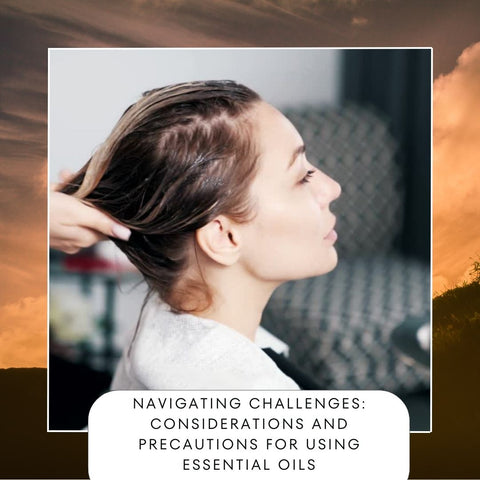
While essential oils can provide numerous benefits, they must be used with caution. Skin sensitivity, allergic reactions, children and infants, pregnancy and breastfeeding, medication interactions, quality and purity, inhalation precautions, and storage and handling are all important considerations when navigating challenges effectively. By taking these precautions and successfully navigating challenges, you can safely enjoy the benefits of essential oils for a variety of purposes, including lice prevention and treatment. Always prioritise safety and seek advice from a healthcare professional if you have any concerns or questions about using essential oils.
Understanding Potential Side Effects and How to Avoid Them
Understanding the potential side effects of essential oils is critical for safe application. Here's how you can identify and avoid them:
-
Some essential oils, particularly when applied undiluted or in high concentrations, can cause skin irritation. To avoid this, always dilute essential oils with a carrier oil before using them on the skin. Before using any new essential oil, perform a patch test to determine your sensitivity.
-
Essential oils can cause allergic reactions, especially for people who have known allergies or sensitivities. If you experience itching, redness, swelling, or hives after applying an essential oil, stop using it right away and seek medical attention if necessary.
-
Inhaling concentrated essential oil vapours can irritate the respiratory tract, particularly in people with asthma or other respiratory conditions. Diffuse or inhale essential oils in well-ventilated areas at low concentrations.
-
Some essential oils, such as citrus oils (e.g., lemon, lime, bergamot), can cause photosensitivity, making the skin more susceptible to sunlight and increasing the risk of sunburn or skin damage. Avoid applying photosensitive oils to the skin before sun exposure, or use them in small amounts and cover treated areas with clothing or sunscreen.
-
Certain essential oils, such as clary sage and fennel, can have hormonal effects and should be used with caution, particularly during pregnancy or breastfeeding. If you are pregnant, nursing, or have hormonal imbalances, do your research on the safety of specific oils and consult with a healthcare professional first.
-
Essential oils may interact with certain medications, including prescription and over-the-counter medications. If you are taking medications, consult with your doctor before using essential oils to ensure there are no contraindications or interactions.
-
Ingesting essential oils can be harmful and should be avoided unless advised by a qualified healthcare professional. Keep essential oils out of the reach of children and pets, and never consume them without proper supervision.
-
Prolonged or repeated exposure to certain essential oils can cause sensitization, in which the body becomes hypersensitive to the oil, resulting in allergic reactions upon future exposure. Rotate essential oils and use them in moderation to reduce the risk of sensitization.
Comparing Essential Oil Lice Treatments with Commercial Alternatives
The efficacy, safety, convenience, and cost of essential oil lice treatments should all be taken into account when contrasting them with commercial alternatives. Both essential oil lice treatments and commercial alternatives have benefits and drawbacks. Essential oil treatments may be a natural and potentially safer option for some people, but they take more effort and may be less convenient than commercial treatments. Commercial treatments, on the other hand, are specifically designed to kill lice and their eggs and are often more convenient; however, they may contain harsh chemicals and pose health risks. Finally, the decision between the two options is based on personal preferences, efficacy, safety concerns, and financial constraints.
The Science Behind Essential Oils and Lice Prevention: What Research Says
Research into the efficacy of essential oils for lice prevention is ongoing, and while some studies indicate that certain essential oils may have insecticidal properties, more research is needed to fully understand their effectiveness. While there is some evidence that certain essential oils may help prevent lice infestations, more research is needed to confirm their efficacy and determine the best formulations and concentrations for use in lice prevention products. To avoid adverse reactions, essential oils must be used safely, with proper dilution and application techniques.
Empowered Prevention: Integrating Essential Oils into Your Family's Lice Defense Strategy
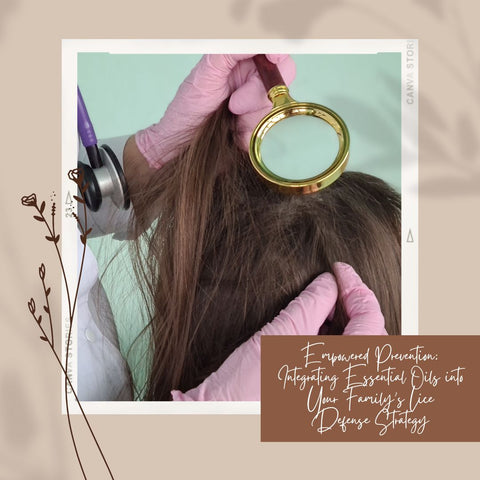
Integrating essential oils into your family's lice defence strategy is a proactive and natural way to help prevent lice infestations. Here's how to use essential oils for prevention: tea tree oil scalp treatment, lavender oil spray, eucalyptus oil hair rinse, peppermint oil hair masks, citronella oil hair accessories, regular head checks, educating your family, and maintaining cleanliness. By incorporating essential oils into your family's lice defence strategy and combining them with other preventive measures, you can strengthen prevention and lower the risk of lice infestations. Remember to use essential oils responsibly and conduct patch tests before applying them to your skin or scalp.
















